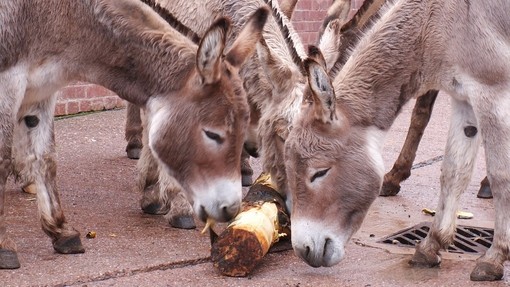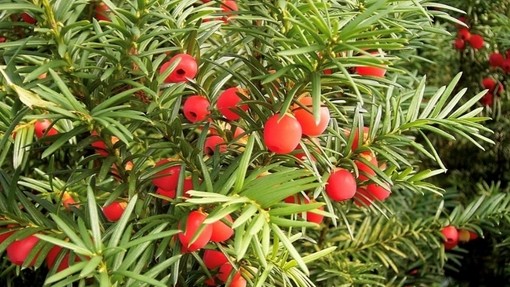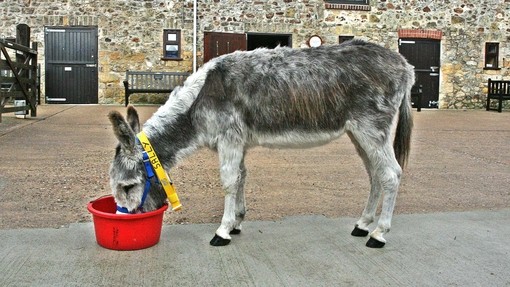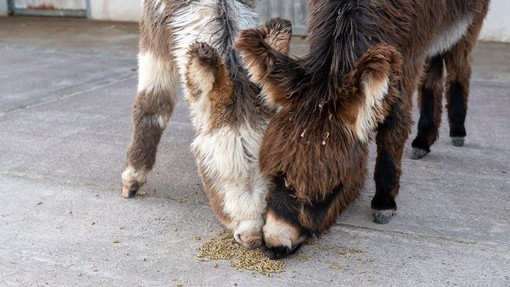Straw
We recommend feeding donkeys quality barley straw as it is high in fibre and low in sugar, and closely resembles the food that a donkey would eat in the wild. Constant access to straw allows a donkey to eat to appetite without consuming too many calories.
Too many additional calories adds a risk that the donkey could put on excess weight, which has associated risks of developing health conditions such as laminitis and hyperlipaemia.
Oat straw may be useful for old or underweight donkeys as this usually has a slightly higher nutritional value than barley straw.
Wheat straw is very fibrous and has lower energy values, but may be fed to young healthy donkeys with a good set of teeth.
Linseed straw is best avoided since the seed is poisonous to donkeys unless it has been boiled, and it is very difficult to ensure that no seed is present in the straw.
If straw is in short supply then priority must be given to using it as a feed source and alternative bedding such as shavings should be used.
Hay
If you plan to feed your donkeys hay during the winter months, ensure you have enough forage in store to see you through the winter as supplies could run out before the winter is over. Never feed donkeys mouldy hay as they may have potentially fatal allergies to the mould. It is best to try and build up a good relationship with your hay supplier to make sure you have a consistent supply of good, clean hay suitable for feeding to your donkeys. Different types of hay available include:
- Meadow Hay is a natural mix of grasses made from grass grown on old pasture and is suitable for feeding to donkeys.
- Seed Hay is also good for donkeys. It is a planted crop of specific grasses, such as rye or timothy, which the farmer makes from the stems remaining after the grain has been taken.
- Hay produced from cow pasture usually has higher energy levels and may be less suitable if fed on its own. However it could be fed mixed with a higher ratio of straw.
Ragwort in hay is very poisonous to donkeys and can kill equines. It can be quite hard to distinguish once it has dried; this is why it is important to know and trust your hay supplier.
Weather conditions tend to influence the cutting season - late May to July. Remember late cut hay will have lower energy values, which may suit your donkeys if they are overweight and require forage with a lower energy content, but not if they are elderly/underweight donkeys that need feeding up. If the hay is cut later in the year a lot of the goodness will have gone out of the grass and some of the grass will have gone to seed. This type of hay provides a much lower energy source than early cut hay and for that reason it is fine for feeding to donkeys.
If the weather in May is good the farmers might make hay in the first week of June and get a second cut at the end of July. This ‘second cut’ hay is usually lower in energy value and again is fine for most donkeys.
Freshly cut hay should be stored in a dry barn for at least three months before feeding. Do not suddenly introduce freshly cut hay to the donkey’s diet as it could cause colic or laminitis. Reduce the risk by mixing the new hay with the previous year’s hay, or mix it with straw over a few days so there is a gradual change over.
If hay is in short supply in your area (or if it is very expensive) then you could look at the following alternatives.
Haylage
Haylage is semi-wilted grass that has been allowed to dry to only 55-65% dry matter (as compared to 85% in hay). The grass is baled, compressed and sealed in tough plastic and the resultant forage is virtually dust-free, highly palatable and nutritious. Once the plastic wrapping is broken (deliberately or accidentally) fungal spores start to grow so the haylage must be used within three to four days (less in warm weather) or discarded. This is why it is better suited to those with more than one or two donkeys to feed.
If there are any signs of mould or yeast growth on a bale once opened it should be discarded, as should any uneaten haylage as this could be toxic to the donkeys.
Haylage can be very variable in terms of nutritional levels; some haylage may be too high in energy to feed to donkeys. If you are unsure about the suitability of locally available haylage as donkey food, we would recommend having it analysed (most of the large horse feed companies provide this service for a small fee) or feeding a commercially available equine haylage marketed as ‘laminitic safe’.
Silage
Silage is not suitable for feeding to donkeys because the moisture level is usually too high, with a low pH, as well as a low fibre and high protein level.
High fibre pellets
There are many brands on the market selling high fibre pellets. Products marketed for equines prone to laminitis are a good choice because they are usually high in fibre and low in sugar. High fibre pellets are a good choice if you need more than grass, hay and straw to build up the weight of an old or underweight donkey.
Care must be taken that the donkey does not eat the pellets too quickly, as it may cause colic, so add water and mix with a small quantity of low sugar chaff when introducing pellets for the first time.
High fibre pellets can be soaked down to a mash, which is particularly useful for donkeys with poor teeth. Avoid any pellets containing cereals grains as these are not suitable for feeding to donkeys. Products marketed as ‘mixes’ are usually cereal grain based and again not suitable.
Short chop chaff products
Consider feeding your donkey chaff, a mixture of chopped up hay and/or straw. There are many types of chaff on the market. These contain variable amounts of chopped rye, timothy or alfalfa grasses and oat straw. Some have added oil, molasses, minerals, herbs or hoof growth supplements while others are high fibre and molasses free.
Chaff products marketed for equines prone to laminitis are good for donkeys that have difficulty eating straw, hay or grass due to poor dentition, and can be used as feed supplements or fed ad lib as a total straw/hay replacer.
Always choose a chaff that is ‘laminitic safe’ and preferably with a sugar content of less than 8% when feeding donkeys.
Dried sugar beet pulp
Sugar beet, a by-product of the sugar industry, is a useful food given in small amounts to tempt a sick donkey to eat or to help an elderly donkey or underweight donkey gain condition. Sugar beet is a source of succulent, nutritious, digestible fibre when added to the feed, although it cannot be fed as a replacement to hay.
We recommend unmolassed sugar beet to help prevent laminitis and unnecessary weight gain. Dried sugar beet pulp is available in shredded or cubed form and must be thoroughly soaked before feeding and used within 24 hours once wet.
Soaking times vary so refer to the manufacturer’s instructions. There are now some quick-soak unmolassed sugar beet products on the market which soak in under ten minutes although it’s always advisable to check the product is fully soaked before giving them to your donkeys.
Succulents
Fruit and vegetables can be fed in small amounts (one or two a day) to provide variety and encourage a healthy appetite. They are a worthwhile addition to the normal food ration in winter and early spring when fresh grass is not available.
Avoid feeding potatoes, anything from the brassica family, onions, leeks, garlic, stoned fruit and anything which is old, fermented or mouldy as these are toxic to donkeys.
Carrots, apples, bananas, pears, turnips and swedes are all safe and usually very popular with donkeys.
Ensure that chopped fruit and vegetables are cut in a way that minimises the risk of choking, such as in sticks.
Minerals and vitamins
Donkeys on a forage only diet may not obtain all of the required vitamins and minerals from the straw, grass and hay in their diets. Therefore, we recommend that in addition to the standard food you supply that all donkeys will benefit from the addition of a vitamin and mineral supplement in the form of a balancer or unmolassed equine mineralised block, designed to supplement their diet all year round to prevent any deficiencies.
Blocks designed for other livestock may be toxic to donkeys as some contain inappropriate mineral levels.
We have successfully used TopSpec Donkey Forage Balancer for donkeys on weight loss or maintenance diets and TopSpec Comprehensive Balancer for those with extra nutritional needs such as growing, breeding, underweight, ill or elderly donkeys.
Water
Water is perhaps the most essential of all nutrients since without it life cannot continue for longer than a few days, or less in adverse conditions. Clean, fresh water should be freely available at all times.
Remember to check water supplies in cold weather to ensure they have not frozen.
Some donkeys, particularly the old or unwell, don’t like drinking very cold water, so it may be a good idea to provide warm water in the winter, particularly if you are unsure if your donkey is drinking enough.
If it is possible provide access to several sources of water to increase the choices available to your donkey, enriching their environment and encouraging them to drink sufficient amounts.
General considerations
- All feed stuffs should be of high quality.
- All equines are sensitive to toxins that can be found in spoiled feeds.
- All feed stuffs should be free from mould.
- All changes to their diet should be made gradually, over at least 7-14 days.
- Donkeys prefer to browse for their bulk and fibre throughout the day.
- Donkeys prefer to eat little and often. Provide aid-lib barley straw.
- Do not over feed your donkey; check the body condition of your donkey regularly.
- Donkeys do not need high levels of sugar in their diets.
- If in any doubt about the energy value or the quality of any feed, it is advisable to seek expert advice.
- Always provide a suitable balancer or mineral lick and permanent access to a clean water supply.
Never feed grass clippings and ensure that your neighbours are aware of the dangers of doing this as it can lead to colic.




